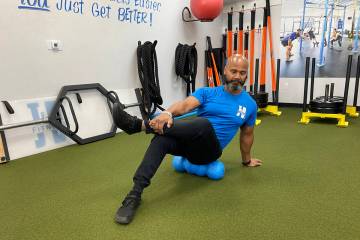Non-profit questions performance of Nevada ombudsman for nursing home patients
Residents at Nevada’s nursing homes have a way of airing their concerns; that is the role Nevada’s Long-Term Care Ombudsman Program is supposed to play.
While some leaders in the industry say the program is fulfilling its role, Brian Lee, the head of Families for Better Care, a national nonprofit nursing home resident advocacy group, said it appears that “there are some political barriers obstructing the ombudsman advocacy” in Nevada.
“It does not appear that the ombudsman operates independent of state government,” Lee said, alleging that state lawmakers receive monetary donations from nursing home operators and “don’t want to rock the boat” with a “truly independent” ombudsman.
According to Follow The Money, a nonprofit organization that tracks political donations, most of $370,600 went to Nevada candidates and committees from hospitals and nursing homes in 2012.
The ombudsman is supposed to be the town crier for nursing homes, Lee said, but it appears that’s not the case in Nevada.
In 2011, Lee said, 896 complaints were made to the state’s ombudsman. Only 342 of them, or 38 percent, were verified.
“If the watchdog becomes a lapdog, there’s a real problem,” he said. “There’s no hired gun for nursing home residents. The ombudsman is the one who’s supposed to be asking questions.”
Nevada’s Long-Term Care Ombudsman Heather Korbulic said her program investigates and resolves complaints for individuals. Also, she said, when officials find regulation problems, they refer them to the state’s Bureau for Health Care Quality and Compliance.
The officials receive at least 10 reports a week, she said, and at least one is referred to the bureau.
“We are working daily to improve the quality of life for residents in long-term care,” Korbulic said.
A report released this month by Lee’s organization found that abuse, neglect and mistreatment of nursing home residents is widespread in Nevada.
Bedsores are frequently found on residents, the report said, and some suffered from dehydration, malnutrition and injuries from falls. Often, residents are lying in their own waste, said the report, which relied on findings from Nevada health inspectors.
The report found Nevada to be one of two states where every nursing home was cited with one or more deficiencies by state health inspectors, and one in three nursing homes was cited for severe deficiency, meaning a resident suffered actual harm or was in imminent danger.
Korbulic said the top complaint registered with her office is about being discharged.
State inspection reports last year showed that one patient was discharged who still needed skilled nursing care. That patient, who suffered from breathing problems, later was taken by ambulance from her home to a hospital, where reports said she became “clinically brain dead.”
Another nursing home resident died after not having a bowel movement for days.
The state’s Long-Term Care Ombudsman Program is intended as an advocacy program for residents of long-term facilities, including nursing homes, said Lori Smetanka, director of the National Long-Term Care Ombudsman Resource Center at the National Consumer Voice for Quality Long-Term Care, an advocacy organization based in Washington, D.C.
The group’s role is to respond to complaints that are raised by residents or other individuals and provide information and resources.
The group also is supposed to advocate for residents at Nevada’s Legislature, Smetanka said.
Lee said his investigation of Nevada’s ombudsman office showed little raising of issues. The office also didn’t propose legislation for improvements. Nevada lawmakers have not passed legislation requiring a staff-to-patient ratio that would help ensure safety of residents, he said.
Lee said federal data show that the Nevada ombudsman office got $1.2 million in 2011, with about $653,000 coming from the state and the rest from the federal government. Each state program has to be consistent with the federal Older Americans Act.
With only 51 nursing homes in Nevada, Lee said, the state’s budget for the ombudsman shows “pretty hefty funding.” He pointed out that Florida has 682 nursing homes and a $2.8 million budget.
Each state has flexibility in terms of how it structures its ombudsman programs, Smetanka said.
“I don’t think the number and level of citations is really reflected on the ombudsman program,” said Marybeth Williams, associate in public policy at the National Consumer Voice. “It could be that the ombudsman in Nevada actually helped identify issues that then the licensing agency cited for noncompliance.”
The program’s role is to help resolve issues to the satisfaction of the residents, Williams said.
Korbulic said complaints about food and concerns about dignity and respect of residents are two of the top three complaints made to her office.
Lee said complaints about dignity and respect often deal with the fact that residents are forced to lie in their own waste.
However, Korbulic said the issues were most often brought up in relation to patients being dressed with the door open.
Smetanka said an ombudsman’s role is to identify issues early before they become severe.
“That’s our goal,” Korbulic said. “To identify issues before they harm anybody or compromise anybody’s safety.”
Smetanka said Nevada has been working to develop a volunteer program, which will strengthen the long-term care program.
“I do think that volunteer ombudsman do have the capacity to strengthen the program,” she said. “They do allow the program to have more of a presence in the facilities.”
However, Korbulic said it’s a slow-growing program, and they need more volunteers. She said she did not know why it took so long in Nevada to establish a volunteer program –– it began in the Silver State in 2011 –– when other states have had the volunteers for years.
Those interested in becoming a certified ombudsman volunteer can call Sue Levinksy at 702-486-3544.
Contact Yesenia Amaro at yamaro@reviewjournal.com or 702-383-0440 or Paul Harasim at pharasim@review journal.com or 702-387-2908.






















